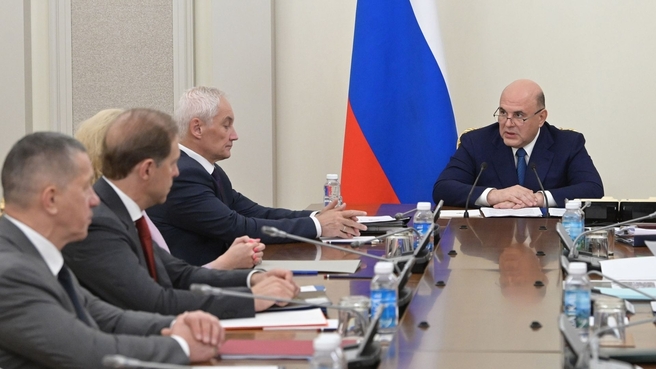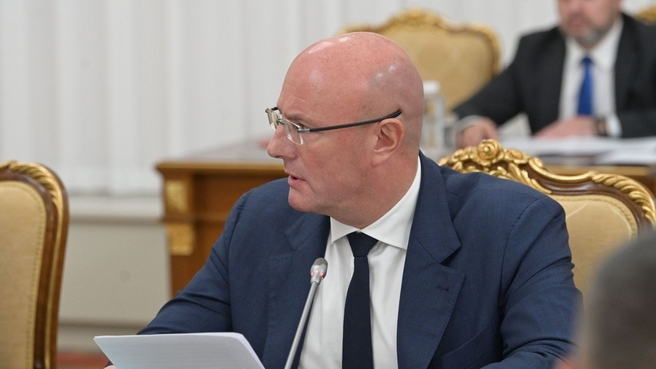Agenda: The Strategy for the Development of Organic Production until 2030, the extension of the fast-track product compliance procedure, and the concept for regulating the quantum communications sector.
Mikhail Mishustin’s opening remarks
Dmitry Chernyshenko’s report on the concept for regulating the quantum communications sector
Excerpts from the transcript:
Mikhail Mishustin: Colleagues,
The Government has developed a Strategy for the Development of Organic Production until 2030. This is an important document that envisages the conditions for increasing the production of environmentally friendly foods and agricultural supplies many times over.
There is a demand for them both in Russia and abroad. Consumers are increasingly trying to choose healthy food for themselves and their families, and entrepreneurs are more actively using advanced technologies in agriculture. It also reduces the environmental burden. There is an additional impetus to develop remote rural areas, where it is easier to grow organic produce, even without mineral fertilisers and plant protection products.
The President also spoke about the need to use our abundant natural resources to increase the production of environmentally friendly products.
Today such foods and agricultural supplies are produced in 47 regions. These are cereals, flour, baby food, canned food, juices, meat, dairy, nuts, berries, processed vegetables and fruit, as well as a number of other important goods. Their production is consistently growing, 8-10 percent annually on average. But so far, organic products of domestic agribusinesses cover less than half of the domestic market.
Some Russian territories, including the Voronezh, Belgorod and Tomsk regions, are already providing additional support to such farmers, by subsidising certification projects, farming machinery lease and property lease contracts and some other aspects.
We will have to accomplish multiple objectives in order to expand production in this sphere. For example, we have to facilitate the mutual recognition of organic certificates with other countries, including Asian and Middle East countries. This will help expand access to foreign markets and streamline sales. We should provide businesses with multiple loan offers. It is also necessary to train more specialists who are familiar with the specifics of this sphere.
All this forms an integral strategy that should become the foundation for establishing a separate industry in the national agro-industrial sector. In the next six months, the Ministry of Agriculture should submit a detailed step-by-step plan for implementing this strategy. Our measures will make it possible to boost the quality of foodstuffs for our citizens, they will facilitate the development of regions and the creation of jobs in the countryside.
Here is one more issue.
Unprecedented sanctions, imposed by unfriendly states, primarily aimed to deprive shops of customary goods, to create frenzied demand, to provoke panicky moods and price hikes. However, we managed to prevent shortages of industrial goods on the domestic market. For this purpose, we implemented numerous measures with the President’s support. First, we provided additional assistance to domestic R&D organisations and manufacturers. We created alternative logistic routes, and we introduced the parallel import mechanism.
Of course, we had to remove as many barriers hampering the delivery of new products to shops as possible during the first stage. From March 2022, we launched a simplified procedure for verifying that specific products conform to technical regulations, as well as to national and interstate standards. This temporary measure allowed manufacturers and importers to submit declarations certifying their compliance with stated specifications instead of spending a long time testing goods at laboratories. We have extended this mechanism until 1 September 2024. The Government has also improved this procedure. From now on, mandatory certification deadlines are extended to six months following initial product sales on the market. This will help shield our citizens from substandard and sometimes downright dangerous products. At the same time, this will give entrepreneurs more time for completely restructuring their business processes in new complicated conditions.
Let us discuss one more issue. Last week, the President took part in the Future Technologies Forum. This event was dedicated to quantum solutions that can speed up many tasks, including research, and help analyse large amounts of data quickly.
Naturally, it is necessary to develop our own companies in this area and introduce Russian-made solutions.
The Government has prepared the concept for regulating the quantum communications sectorfor the upcoming 6.5 years. Quantum communications are used to create and operate reliable communications systems.
Such networks are needed both in government administration systems and for securely transmitting important data of citizens and business. The technology is already sought-after by banks and telecom operators.
As part of the concept, we will create a quality regulatory framework for the industry and conditions for a gradual transition to the new ways of data protection and the introduction of advanced solutions.
Mr Chernyshenko, please tell us more about the concept and about the overall progress in quantum communications.
Dmitry Chernyshenko: Mr Mishustin, colleagues.
The concept you are talking about on regulating the quantum communications sector to 2030 is the answer to the demand in the industry for a regulatory framework.
First of all, I will explain why we consider quantum communications important. The technology is used in encryption and data transmission. Information transmitted through a quantum channel cannot be intercepted without the knowledge of the addressees, that is, the technology allows for transmitting data over great distances in a completely secure way. The current low level of regulation has been noted by all participants in the ecosystem as a hindrance to its development.
This issue, as well as issues related to uniting the efforts of major companies seeking breakthroughs in quantum systems, were the key topic at the 13th Future Technologies Forum on 13 July with the participation of President Vladimir Putin.
Speaking at the forum, the President made a point about comprehensive support and development of this promising field.
The work on this document was conducted as part of the Government-approved roadmap, Quantum Communications. I would like to thank General Director of Russian Railways Oleg Belozyorov and leader of Rosatom Alexei Likhachyov for their cooperation and work.
The concept was developed in a short time, 10 months earlier than planned, which confirms the priority of quantum solutions for the country’s technological development.
Today, quantum communications mean communication, cryptography and information security all in one.
We have already created a pilot section of the backbone quantum network Moscow – St Petersburg and a segment Moscow – Nizhny Novgorod. Thus, the total length of the quantum network in Russia is now 1,147 kilometres. By the end of 2023 it is planned to build new sections: to Kazan, Voronezh, and Rostov-on-Don. The total length is an additional 1,400 kilometres.
Lines in the inter-university quantum network are in operation or under development. The project participants are the leading universities of the country, such as Moscow State University, ITMO University, the National University of Science and Technology, Lobachevsky University and a number of others.
Approval of the concept will give an impetus to the development of this field, attract new investors and consumers and, of course, stimulate demand for equipment in the commercial sector.
The document also implies creation of a liability insurance to ensure the protection of the rights of all market participants.
As for potential consumers, today major banks, mobile operators and other market players are already showing high interest in quantum technologies.
Of course, this document is only the first step in our systematic work to fulfil the President's instructions.
After the concept is approved, regulatory documents will be developed at the level of ministries and departments.
The concept shows that the Government is actively involved in shaping the regulatory and technological landscape of the industry, and this in turn will accelerate the programme of commercialising this technology and will become a benchmark for other industries, such as quantum computing.
Mr Mishustin, I ask for your support.
Mikhail Mishustin: Thank you, Mr Chernyshenko. Achieving technological sovereignty today, which the President is talking about, is impossible without such new technologies. And it is necessary not only to address issues related to the emergence of domestic solutions, but also to implement and test them. Make these solutions applicable to businesses and citizens.
Quantum communications is the most important field we should be engaged in. And to continue its progress, it is necessary to create a favourable regulatory environment. Remove all barriers so that it can be introduced more widely. I would ask you, Mr Chernyshenko, to keep this issue under your personal control.













